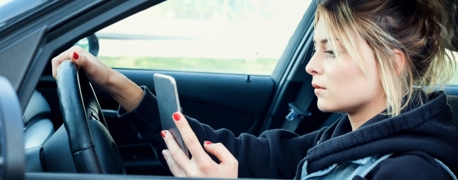Can Different Music Choices Affect Your Driving Habits?

Research has long supported what we have always known—playing your favorite music in the car improves your mood and overall outlook. In the wide spaces and open skies of many Texas highways, the only thing that keeps us awake on long drives is our music. A 2012 study found that when drivers played music, their moods were more positive and upbeat. But is that a good thing?
An Israeli study from 2013 shed some light on the relationship between your mood, your music, and your driving. They enlisted 85 young drivers to complete six driving challenges alongside an experienced driving instructor, totaling 40 minutes of drive time. On two of these trips, the drivers were allowed to play their favorite music. On two trips, researchers played easy listening music. On the last two trips, no music was played.
All 85 drivers committed at least 3 errors in 1 trip or more. 27 drivers needed only a verbal warning, but 17 needed the instructor to intervene to avoid an accident. Keep in mind, due to the presence of the instructor, the subjects drove safer than they might usually drive. How did their music affect their driving performance?
- With drivers’ music choices: 98% made errors
- With no music at all: 92% made errors
Here’s what’s strange—there’s a tiny difference between the drives that featured their own playlists and no music at all. You would expect a much larger difference, especially since drivers increased the volume of their own music while driving. But how did the drivers do who had background music and soft rock softly playing?
Only 77% made errors on these trips.
Some researchers believe that our favorite songs inspire driving behaviors that ultimately distract us. These include singing, head rocking, or even miming instrument playing while driving. Yes, air guitar solos are incredibly dangerous if you do them at the wheel--especially when on a demanding drive or road.
It’s All About the Beat
Another study suggests that upbeat music in the car can end up being a hazard. According to the research project, music that you listen to while driving can increase your risk of an accident, depending on the nature of the beat. Researchers took 8 participants and analyzed the changes in their driving habits based on what kind of music was playing from the stereo.
Each driver was instructed to drive for 500 miles. The first 250 miles were without music, but after that, drivers were instructed to listen to a designated playlist. Each playlist featured 1 of 4 musical styles: dance, hip-hop, heavy metal, and classical. A male and female driver each received one of these playlists for their drive.
Those who were driving too fast music or music with an upbeat tempo had a tendency to speed or drive recklessly. This is because scientific research proves that upbeat music can increase levels of adrenaline in the body and accelerate a person's heartbeat. This can cause a person to get distracted while behind the wheel, but it also motivates that driver to increase his or her speed.
Other findings regarding music show that specific genres may affect people seriously. One motorist in the study was told to drive to heavy metal, and increased his speed as a result. Another driver was told to listen to hip-hop, and she tended to brake and accelerate more suddenly than the other drivers.
Is Classical Better for Driving?
However, it’s not the style of music that led to different driving habits. Many proponents of classical music cite its soothing effect on listeners, but the driver listening to the classical playlist drove more erratically than normal. One driver stated the variety of tempos and musical changes gave her a headache.
Specifically in this study, the song Hey Mama by the Black Eyed Peas created dangerous driving habits. The song Come Away With Me by Norah Jones encourages safe driving behaviors. Researchers suggest that drivers listen to music with a low beat and a soothing effect. This will help keep them from feeling irritable or rushed.
What’s the Safest Music to Drive To?
Dr. Simon Moore of London University believes the ideal driving music matches a person’s resting heart rate (between 60-80 beats a minute). At this tempo, a driver’s adrenaline is not affected by the music, and their mood is not altered in a way that affects their driving. He does add that listening to music you don’t like can create as much of a distraction as a person’s favorite music.
So, in summary: choose easy listening that you like, but isn’t necessarily music you love enough to sing. While this may not be good news for people who love rocking out to their favorite songs in the car, it may mean safer roads for all of us if we kept our personal karaoke sessions separate from our commutes.
Talk to a lawyer at Arnold & Itkin today if you were involved in a car accident and the other driver's music choices may have encouraged his or her dangerous behaviors. Whenever you are not at-fault for an accident, you have the right to seek compensation for all damages. Don't hesitate to discuss your situation with a Houston personal injury lawyer at Arnold & Itkin today!


